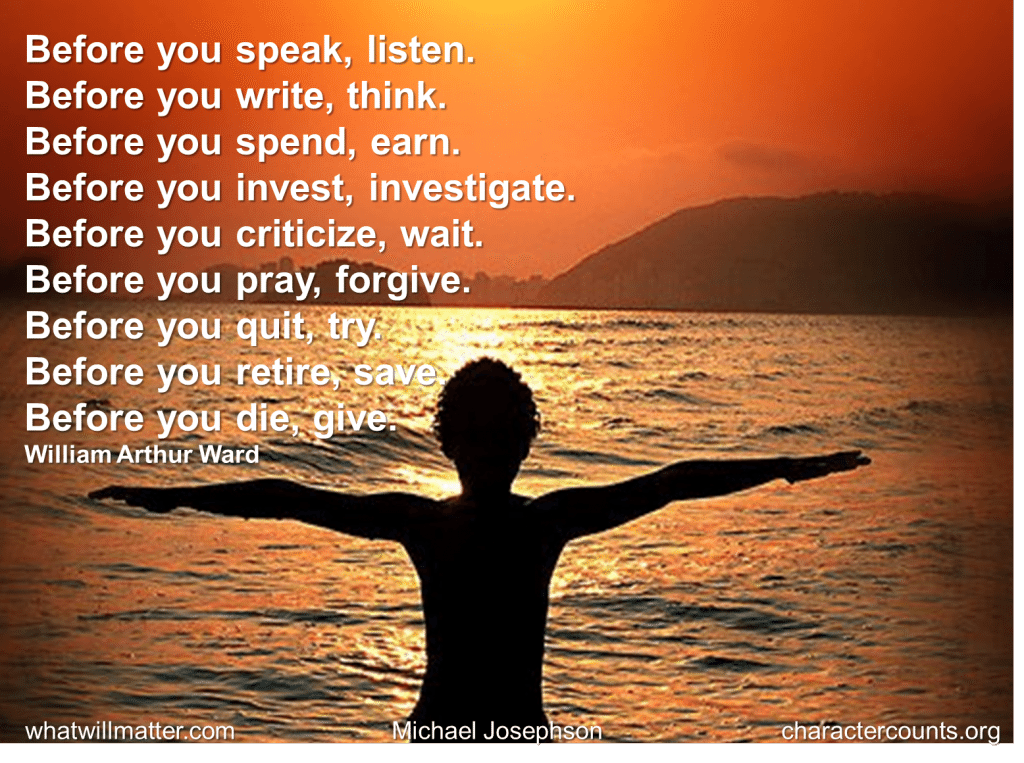In the spiritual and ethical landscape presented by the Bahá’í Faith, the adage “Before You Speak – Thinking with Love and Wisdom” emerges as a compass that guides interpersonal interactions and self-expression. This principle encapsulates a profound approach to communication, urging believers to engage in careful contemplation before verbalizing thoughts. It is a call to embrace both love and wisdom, allowing these qualities to steer discourse towards constructive and compassionate outcomes.
The foundation of this teaching rests upon the understanding that words hold immense power. They can uplift the spirit, foster connection, and promote unity among individuals and communities. Conversely, thoughtless words can inflict harm, sow discord, and perpetuate misunderstanding. Thus, the Bahá’í teachings encourage an introspective pause that invites individuals to reflect on the implications of their words prior to their utterance.
At the heart of this philosophy is the concept of love—a transformative force that transcends ego and self-interest. Bahá’ís believe that true love encompasses a deep regard for others, reflecting their intrinsic worth and dignity. When speaking from a place of love, individuals are more likely to consider the impact of their words on others, creating an environment where dialogue flourishes. This approach invites curiosity about the perspectives and feelings of those with whom one interacts, nurturing empathy and understanding.
Complementing the principle of love is the notion of wisdom. Wisdom, in the Bahá’í context, involves the discernment and knowledge necessary for meaningful communication. It requires a thoughtful examination of context, audience, and intent. Speaking without the application of wisdom can lead to superficial expressions devoid of depth or deliberation. Therefore, the teaching advocates for a cognizant approach to speech—one that weighs the significance of words and their potential consequences.
Integrating love and wisdom into our speech is not merely a moral directive; it offers a transformative shift in perspective. Every mode of communication becomes an opportunity for connection rather than a chance for division. This paradigm encourages individuals to view each interaction as a sacred exchange, wherein creativity and thoughtfulness are invested into the art of dialogue. The soul of this engagement lies in the genuine desire to understand and be understood, marking a departure from reactive communication rooted in frustration or impulsivity.
Further, the Bahá’í teachings elucidate the importance of intention. Before verbalizing opinions or thoughts, one should engage in self-reflection to ascertain the intent behind the words. Is the goal to teach, to criticize, or to uplift? Understanding the underlying motivation fosters accountability and integrity in communication. This scrutiny encourages individuals to articulate their views in a manner that is considerate and uplifting, reinforcing the overall ethos of love in speech.
Moreover, recognizing the necessity of pausing before speaking cultivates an atmosphere of mindfulness. In the hustle of daily living, it is easy to lose sight of the contemplative essence that true communication requires. However, a deliberate pause gives room for clarity. For instance, in moments of conflict, a deep breath and a moment of reflection can alter one’s response from one driven by emotion to one shaped by reason and compassion. This mindfulness has the potential to diffuse tension and redirect conversations towards healing and collaboration.
Bahá’í teachings further illustrate the significance of active listening as a complementary practice. Genuine listening is an art that goes hand-in-hand with thoughtful communication. By actively engaging with the speaker, one not only enhances understanding but also demonstrates respect and care. This reciprocity forms a solid foundation for productive dialogues and engenders a culture where all voices are valued. Consequently, when speaking, there exists a reciprocal responsibility to ensure that the discourse is reflective of a collective aspiration towards unity and peace.
Additionally, the Bahá’í concept of oneness allows for a broader lens through which to consider communication. Each individual is seen as a constituent part of a greater whole, and thus the potential impact of words extends beyond the immediate. Recognizing the interconnectedness of humanity necessitates a more careful consideration of language. A single utterance can resonate through a community, influencing perceptions and relationships. This awareness amplifies the responsibility one carries in choosing words wisely—echoing the age-old adage that words once spoken cannot be taken back.
Engaging in a discourse founded on love and wisdom also plays a pivotal role in healing divisions within society. In times marked by polarization and unrest, the teachings prompt individuals to rebuild connections through empathetic engagement. Through the lens of service, speaking becomes not just an act of self-expression, but rather a means to nurture communal bonds and seek common ground. When rooted in love and wisdom, expressions can transcend barriers, inviting diverse perspectives into the fold.
Embracing the essence of “Before You Speak” ultimately aligns with the broader Bahá’í goal of world unity and harmony. These teachings advocate for a collective transformation in the manner we relate to one another—encouraging a departure from divisive rhetoric towards an ethos of collaboration and acceptance. The call to integrate love and wisdom into our speech is both a personal and communal journey, fostering a legacy of kindness, understanding, and profound connection.
In conclusion, the Bahá’í principle of thinking with love and wisdom before speaking serves as a guidepost for conscious communication. By embracing these teachings, individuals not only enrich their personal interactions but also contribute to a more harmonious society, where dialogue is steeped in compassion and clarity. Each word has the potential to pave the way for deeper understanding, healing, and unity—a promise that beckons every individual towards the transformative power of purposeful speech.
